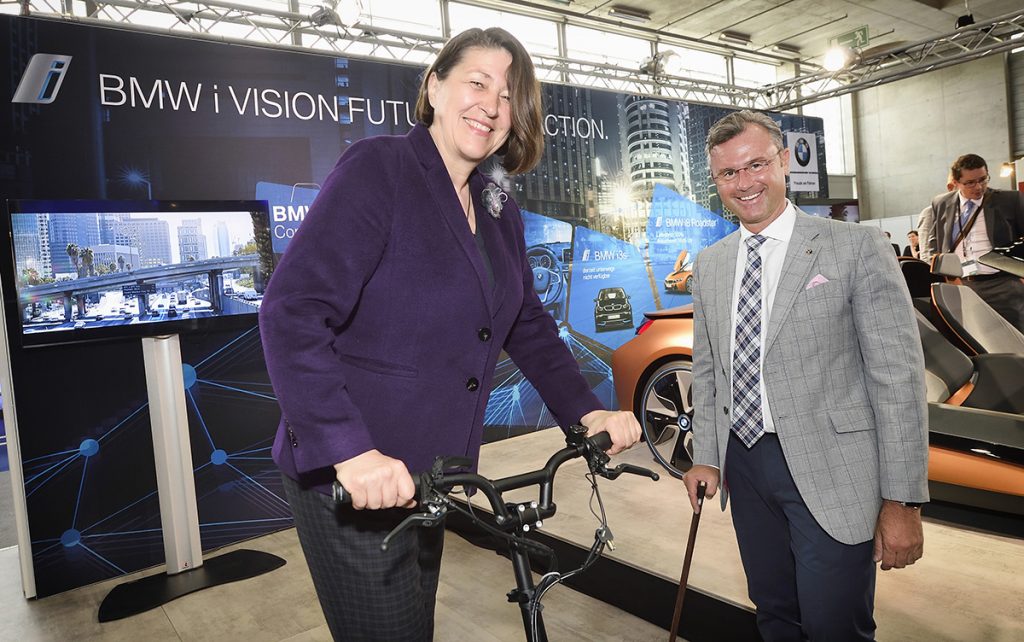
Bigger isn’t better
Road safety at TRA2018, the EU flagship conference on transport research
With over 3300 participants and hundreds of presentations, and hundreds more posters, the 2018 Transport Research Arena (TRA) held in Vienna was the largest conference we have been to for a long time. But bigger doesn’t always mean better.
25,000 deaths on EU roads
“We lose 25,000 citizens on EU roads,” EU Transport commissioner Violetta Bulc said opening the conference. “We must create a more favourable environment for transport.” Road safety was an important theme. But most of the solutions on offer were based on technology, higher and higher tech, such as self-driving cars or self-healing roads. With so little attention to walking and cycling, ECF was one of the few voices for the freedom of cycling, and its many co-benefits.
Is high-tech the answer?
The main entry was dedicated to one show piece from TRA sponsor BMW. A golden high tech car that got so much attention it needed a full time security guard to protect it. BMW had another high tech solution on offer: a battery powered scooter that anyone could take for a test ride*.
“Cycling and walking are often overlooked as solutions to the problems urban policy makers face. ECF keeps them on the table with facts and figures that show the benefits of active transport,” ECF’s Dr Randy Rzewnicki said, noting that at TRA2018 most people were talking about tunnels, trains, planes and cars. ECF was at the conference to talk about reducing congestion with walking and cycling in EU co-funded project FLOW**.
Cycling saves lives
ECF presented solutions that show that active transport, walking and cycling saves lives. The WHO HEAT tool is part of the suite of modelling tools in the FLOW toolbox. Recent WHO HEAT calculations showed that “15 minutes of walking or cycling can save tens of thousands of lives,” said Dr Rzewnicki. “If every adult EU citizen walked or cycled for 15 extra minutes per day, we’d have 100,000 fewer people dying prematurely, each year.”
Many of the presentations were on self-driving vehicles and automation at TRA 2018. The automation of transport affects rail, freight and private transport alike. Nynke Else Vellinga from the University of Groningen has investigated this central aspect of automation in her research: “Before handing over control to an automated vehicle, there are technical but also legal challenges to overcome. Who is liable for accidents caused by automated vehicles? Who has to pay for the resulting damage? The user or the manufacturer? That is what my research and presentation at TRA 2018 revolve around: the legal challenges concerning automated driving especially regarding technical regulations, traffic laws and liability.”
How safe is safe enough?
Traffic safety is also relative. Automated systems have many possibilities to make traffic more and more safe. Laws and regulations have to define the specifications of what a modern transport system of the future can look. Many experts at TRA 2018 warn against too strict rules because they inhibit innovation. Prof. Dr. Peter Sweatman from the University of Michigan, USA, and director of CAVita emphasises that road safety needs control, but it is equally important to leave room to drive developments. At the same time, he asks: "how safe is safe enough?" and points out the differences in cultures, because every person and country see the need for degrees of traffic safety differently - and these cultures must be harmonised so that the transport systems function optimally. One of the questions that need to be answered is: "What is more valuable to us? Safety or the protection of our personal information?"
Footnotes
* The conditions for trying the electric scooter included signing a detailed release form and wearing a helmet.
** See the full list of successfully implemented FLOW measures and recommendations here.
SEE RELATED STORY: Walking and cycling reduce congestion and save lives
Regions:
Network/Project Involved:
Topics:
Contact the author
Recent news!
Upcoming events
Contact Us
Avenue des Arts, 7-8
Postal address: Rue de la Charité, 22
1210 Brussels, Belgium









